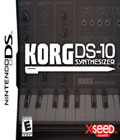How do you review a total non-game as a game? This seems to be a question I keep stumbling upon lately, with Line Rider 2: Unbound turning a software toy into a game to some success, and now this, which takes a classic sound-making tool and just drops it onto a tiny little system. That's it.
The Korg DS-10 Synthesizer software can't be accurately treated as any sort of game. Sure, you have the developer logos when you turn it on, but that's about it. Once you load in, you've got a set of 18 saved sessions, two demos to start off with, and basically nothing else to go by. All you have is the synthesizer and what you can do with it — and that, my friends, is a lot. It's perhaps more than many typical users could handle.
DS-10, being pretty much a straight conversion of Korg's MS-10 synthesizer, offers you complete tools for making basic techno and synthesizer works. About the only thing you'd need to use this as a real synthesizer is an output to plop it into your computer, and you could be mixing up new indie techno without too much difficulty. The key words there are "too much," when you realize that you need to just plain experiment … a lot.
The game includes a modest 54 pages of manual, which makes it one of the largest the DS has ever had, and yet it only makes a tiny dent in the true complexity of the system. Quite simply, the manual tells you what each thing does, serving as a fairly complete technical explanation. Beyond that, however, you're on your own. You get no explanations about how to mix stuff and no ideas about what sounds to make; nothing is given to you. You get to start experimenting and just see (and hear) what happens.
Let's just say that I didn't get too far in several hours of messing around, but what I recognized was a sense of unbridled potential like few things I've seen on a game console. I cannot even begin to guess how many different sound bases you can design with the arrays of sliders and patch panels you are presented with, but some searching on YouTube indicated that people who had taken more time — or had existing experience with synthesizers — could pull off pretty thorough creations, only an audio conversion away from being perfect samples to turn into advanced techno, or even being solid works on their own in the MIDI tradition.
There are no fancy graphics of any sort in DS-10; panels are clean and reminiscent of the real synth, all organized via one "map," the only new element to the system. Everything is kept in simple 2-D, letting you see relationships between objects and quickly switch between them in swift order.
About the only special feature the game offers is eight-way multiplayer, allowing a group of DS-10 owners to link up their synths and creations. Some limitations are implemented, but ultimately, the tools of multiplayer are equivalent to stringing several DS-10s together to form more complex works. The fact that this also serves as a good tool for collaboratively making music on the fly shows where the tool's real value stands. Direct out-and-out Data Exchange is also provided locally, though some Wi-Fi features would have been nice.
Start with nothing, make everything: This is the attitude that AQ Interactive has passed to you, the player, with Korg DS-10 Synthesizer. The results are greatly successful in many ways, but could perhaps have benefited from more examples and a basis off of which to work off. The accessibility is rather limited as a result, but those who either have the existing knowledge and are just looking for some fun and mobile synthworking, or are willing to take some serious time to delve in, are going to find a lot to like and a lot to work with.
Score: 8.0/10
More articles about Korg DS-10











 This music creation software combines the touch interface of the NDS with the design concept and function of the famous KORG MS-10 synthesizer. Ultra-high-quality sound sources provided by KORG, one of the worlds top musical instrument producers. A perfect choice for aspiring musicians and professionals.
This music creation software combines the touch interface of the NDS with the design concept and function of the famous KORG MS-10 synthesizer. Ultra-high-quality sound sources provided by KORG, one of the worlds top musical instrument producers. A perfect choice for aspiring musicians and professionals.








